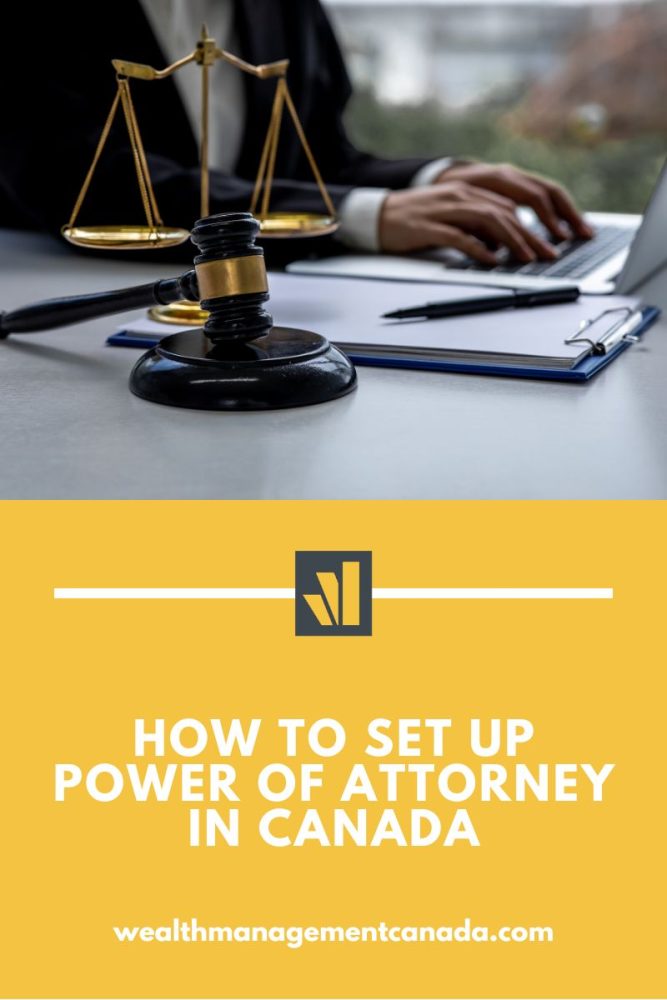With time, a lot of Canadians become concerned about their money, property, and financial management. This is especially true if one has amassed wealth throughout their lifetime that they’d like to protect and preserve. It is for this reason that they seek professional advice on how to set up power of attorney in Canada.

Table of contents
Power of attorney is a legal contract between you and the person you want to give the authority to manage your money or property. However, it is important to know how a power of attorney works before you use them. No one should ever pressure you into signing a power of attorney, as you need to carefully consider all options before making a decision. This article further discusses the different types of power of attorneys in Canada and how they work.

START WORKING WITH A WEALTH MANAGER NOW
What is power of attorney in Canada?
A power of attorney (POA) in Canada is a legal document that gives someone the authority to make decisions on your behalf. For instance, illness or disability may prevent you from properly managing assets like your money and property yourself. The POA contract gives authority to another person to act in your interest.
The authority can be given to your friend, family member, a lawyer, or a trusted entity. Although, the other party does not have to be a lawyer to be your power of attorney. You can choose the criteria surrounding the contract under the terms of your POA. Note that setting up a power of attorney is voluntary.
What are the three different kinds of power of attorneys?
In Canada, there are various types of powers of attorney with each of them addressing the needs of different estate planning.
1. Power of Attorney for Healthcare
A power of attorney for healthcare gives another person the authority to make healthcare decisions on your behalf if you are sick or disabled. This type of POA involves your quality of care and the decisions surrounding the use of life support in your care.
You need to choose an attorney who is ready and knowledgeable about handling the challenges the responsibility may bring. While this decision may depend on the person with authority, a health professional can also make decisions about medical treatment or admission to a care facility. They determine if you can make these decisions on your own before your attorney can act.
2. Continuing Power of Attorney for Property
A continuing POA for property gives another person the authority to act on your behalf in financial matters. It is a continuous document because it only applies when you are not capable of thinking for yourself.
The POA document only becomes effective once you sign. Some of the activities your attorney can do on your behalf to manage your financial affairs include:
- Pay your bills.
- Monitor your investment portfolio and ensure your assets are protected.
- Apply for benefits you may be entitled to because of your present condition.
- Collect your pension and other income you are entitled to.
Note that there are issues to consider when setting up a POA for a property and they include:
- What will make the power of attorney take effect?
- What proof will the attorney prepare to show that they have the authority or that the power of attorney is effective?
- Whether the power of attorney has access to grants or other authority for financial matters.

START WORKING WITH A WEALTH MANAGER NOW
3. Non-continuing Power of Attorney for Property
A non-continuing power of attorney is used in specific cases for a certain length of time. This could apply in instances where you are out of the country. Here, you can outline the various tasks your attorney can do on your behalf, and for how long.
A non-continuing power of attorney may no longer be effective if you are mentally challenged. This is not the same as a continuous power of attorney. However, you should also have a continuous power of attorney in place.
Related Reading: Inflation and the Market: How do they interact?
Is it better to have one power of attorney or two?
In some cases, it is a great decision to have one person as your power of attorney, and in other cases, it is important to appoint two. Your brother may be your top option, but having your niece as a backup option means you still have support if your first option fails.
However, disagreements over the legitimacy of your POA document may come up if multiple people are designated as power of attorneys. These disagreements make it difficult to make the right decisions, and the only answer may be a guardianship process.
Does POA need to be notarized in Canada?
Knowing how to set up a power of attorney in Canada is very important. Each province has signing requirements, but ordinary and continuing POAs usually don’t have to be notarized if you are physically and mentally capable when designating them.
Although, there are two good reasons for notarization. First, it ensures your POA document has a genuine official-looking signature. Second, it removes issues that may occur when dealing with other parties who may not agree with what is happening.
How to Set Up Power of Attorney in Canada
To set up a power of attorney in Canada, both parties must do the following:
- Power of Attorney: Your attorney should be someone you trust with your personal and financial matters. You can also choose an external company to represent you as a power of attorney.
- Scope of their power: What do they think about having control over your personal affairs, finances, and property? Is this a responsibility they are willing and able to take on?
- Get the POA document witnessed or notarized: Depending on the province or territory you live in, the requirements to witness or notarize your POA will vary.
If you want to know how to set up a power of attorney in Canada, you will need to prepare the following information:
- A written request to set up a POA, including a reason to set up the document on your account, with your attorney’s signature
- A clear photocopy of your attorney’s valid government-issued photo ID. Below are some of the acceptable forms of ID:
- Canadian passport
- Canadian Driver’s license
- Canadian Forces ID
- Permanent Resident card
- Certificate of Indian Status card
- Provincial/Territorial ID card
- Information about the attorney:
- First and last name with no initials
- Phone number
- Physical address (P.O. boxes and general delivery addresses are not accepted)
- Employer (or indicate if your attorney is self-employed)
- Industry of employment/self-employment (for example medical, finance, etc.)
- Occupation (be specific, for example, ‘Property Manager’ instead of ‘Manager.’ Indicate if your attorney is unemployed, retired, or a student)
- Date of birth
- One of the following for verification purposes:
- Your name and date of birth
- Your bank account number
- Details of account-specific information, such as a copy of one of your previous statements
- A legible copy of the POA document that:
- Includes the words ‘Power of Attorney’ and grants associated powers
- Includes a complete copy of all pages
- Complies with the formal legal requirements in the province or jurisdiction in which it was executed
- Is witnessed, according to formal legal requirements, with the date of the signature matching the date of execution
Related Reading: What is a trust fund in Canada?
The Cost of Setting Up Power of Attorney
The cost of setting up power of attorney depends on the document you choose to authorize to a lawyer. The price for a power of attorney document ranges from $100 to $400. However, you can find a power of attorney blank template for less than $20 and sometimes for free if you go for a conventional approach.
Costs to Anticipate
The costs to anticipate for the power of attorney may vary. It may depend on your needs, how long it takes to draft the power of attorney, and the number of times the lawyer meets with you. For instance, below is a cost breakdown for how to set up power of attorney in Canada:
- Your attorney may have other expenses for telephone, postage, etc.
- If the attorney for your POA document is also your lawyer and you request legal work like purchasing properties, they may charge for the extra work.
- The Public Trustee and trust companies charge fees based on the value of your estate and your income.
Overall, it shouldn’t cost more than $1,000, and will most likely be under $500.

START WORKING WITH A WEALTH MANAGER NOW
How much does a power of attorney cost in Canada on average?
Fees for power of attorney may vary based on the type of POA, its length, and complexity, but the average cost of a power of attorney in Canada is around $300. Usually, some lawyers charge by the hour, but with an average rate typically within the range of $250 to $350.
However, you can also gain access to drafts of some POA forms online and at a lower cost. Depending on your province, the only fee you may have to pay is for the notarization of signatures.
Set Up Power of Attorney in Canada to Preserve Wealth
While you may experience various risks when setting up a power of attorney in Canada, there are also benefits in the law to protect you. The document is designed to protect your health, personal decisions, and preserve your financial matters.
An experienced estate lawyer in Canada can help you prepare your power of attorney to protect you and your family from unnecessary stress and hardship. Besides, you don’t want to leave your loved ones wondering what they should do or who has the authority to make certain decisions on your behalf. Consider setting up power of attorney today!
Read More: Will Planning Guide Canada